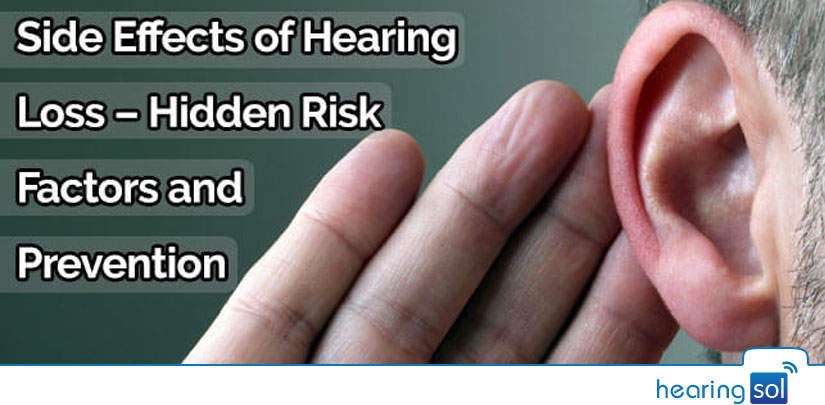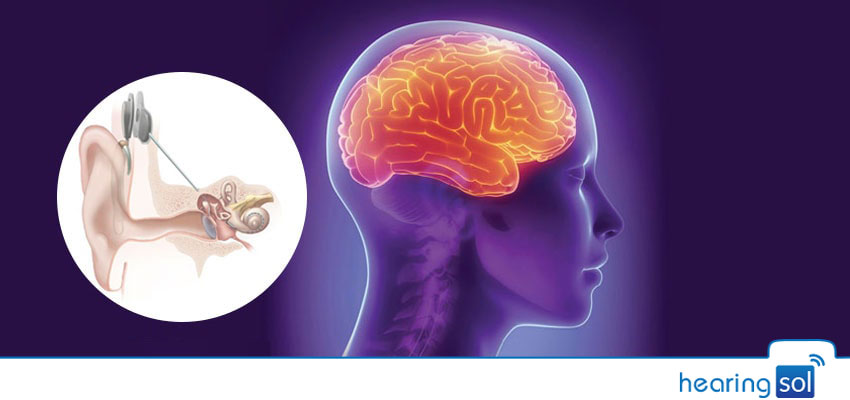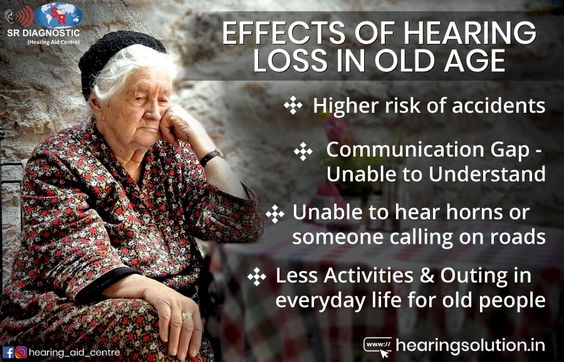
Have you ever thought that how much your hearing loss can cost? The cost of untreated hearing loss can cost per person annual loss of income (up to) Rs 21,07,120.
Well as you know a person’s hearing gradually decreases as they grow older, so you must take care of your ear health. Hearing disability affects our social and emotional well-being and quality of life.
You can purchase the latest hearing aids at a fair price through HearingSol, If you need any assistance or you have a query regarding Side Effects of Hearing Loss, feel free to call us at +91-9327901950. We are always here to help you.
There are many major side effects of hearing loss that can cause serious problems.
Researchers have started identifying the hidden risk factor that occurs with hearing disabilities especially when it affects the brain.
New technologies are collecting some surprising data. Hearing disability is easy to ignore but if you avoid it for a long time then it can cause serious health issues.
So in this article, we are going to discuss the Side effects of hearing the loss in every way of our life.
Major Effects Which Can Be Caused Due To Hearing Loss
1. Psychological Effects
Hearing loss if not treated can affect the mental health of an individual. Psychological problems include:
A) Social Phobia– Consistent fear of social situations and performance or interacting with people.
B) Anxiety in various forms– When you are not able to hear sounds of your surroundings like laughing, crying, siren, phone, or even someone approaching you, your level of anxiety and subsequent stress will increase as a result. It causes a sense of uneasiness.
C) Depression– Hearing loss affects the daily life of an individual and leads to depression and serious mental health. Hearing-impaired people experience negative emotions, including awkward, embarrassed, inadequate, different, or abnormal. A study has found that people aged 50 and more hearing loss are more likely to suffer from depression, frustration, and emotional stability.
D) Stress – High-stress levels have been linked to a higher risk of heart disease, cancer, and other diseases. Being unable to hear increases stress levels for many people.
E) Post-traumatic stress disorder– It is a development of fear during or after experiencing a scary, shocking, dangerous, or traumatic situation. Some people recover from the initial symptoms but those who are not able to recover suffer from PTSD.
F) Psychological and overall health – The mind and body have a powerful connection. When a person’s psychological health suffers, their overall enjoyment of life can decrease.
G) Obsessive Compulsive Disorder and/or personality– Repetitive behavior(like counting, tapping, or doing other senseless things) due to stress and impairment which is time-consuming.
Some other psychological effects are:
- Embarrassment
- Depression
- Anxiety
- Shame, guilt, and anger
- Low self-confidence/self-esteem
- Stress
- Psychological and overall health
2. Physical Effects
Along with mental health, hearing loss problems also include physical effects. People having hearing loss suffers less physical well being than those with normal hearing.
Without our hearing, we may miss important warnings and alerts that enable us to protect ourselves and our families.
Therefore, in physical terms, the effects of hearing loss often lead to:
A) Reduced alertness and increased risk to personal safety. Not being able to hear smoke alarms, severe weather alerts, or a vehicle approach can lead to serious safety issues.
B) Reduced job performance and earning power. If an employer doesn’t understand why you can’t follow a conversation or you appear to struggle with listening or following instructions, this can negatively impact your career and financial earnings.
C) Negative long-term effects on brain function and memory. Studies have shown a direct link between hearing loss and a decline in cognitive abilities.
Some other physical effects are:
- A headache
- High Blood Pressure
- Vertigo
- Tiredness
- Tense muscles
- Sleeping problems
- Stomach problems
3. Social Effects
The major impact of hearing loss is on the social & community life of an individual. People with hearing impairment often find it difficult to communicate and taking part in social activities.
Research showed that the effects of hearing loss can lead to negative social consequences, including:
- Isolated and participating in fewer social activities
- Lack of concentration
- Problems in social interaction and reduced social activity
- Loss of intimacy
- Personality change due to adjustment
- Feeling of inadequacy
- Difficulty in distinguishing sounds, which may sometimes seem to others like you are ignoring them
- Avoidance or withdrawal from social situations
- Social rejection and loneliness
Hearing Loss And Dementia
Dementia is a condition marked by memory loss and trouble with thinking, problem-solving, and other mental tasks. Studies show that Hearing Loss may be the risk factor for dementia.
The link between hearing impairment and dementia is not yet found, researchers are still working to find the relation between them.
The increased risk of depression, social isolation, and brain overload are among the current theories.

By seeking help for hearing problems, a person with hearing impairment can improve his mental health, relationships, stress level, and anxiety.
Effects Of Hearing Disorder On Academic Performance
Hearing plays an important role in the mental and social life of a child. Children suffering from hearing impairment may face the given problems in their school life-
- Any kind of hearing impairment can lead to delay progress at school, which leads to learning and behavioral problems.
- Struggle to cope up with the increasing complexity of the language and social interactions.
- Even the children having a partial hearing impairment can have problems in reading, writing, learning, and expressing themselves.
- They may miss or misread classroom instructions.
- The poor academic record leads to depression and a lowering of self-confidence.
Side Effects of Hearing Loss On Old Age People
Old age people suffer a lot from this disease. Higher risk of accidents, communication gap & less social interaction is some of the outcomes of age-related deafness.

Signs/Symptoms Of Hearing Loss
There are signs and symptoms which can help you to find out if you have a hearing impairment. Signs include-
- You are unable to hear someone 2-3 feet away from you.
- You need to raise your voice to be heard.
- After being in a noisy place, you feel ringing in your ears(Tinnitus).
- Sounds around you become dull or muffled after leaving a noisy place.
How To Prevent The Risk Of Hearing Loss
1. Know What Is Risky
There are certain types of sounds that can cause hearing problems. Recommended exposure to sound is below 85 dbA in the workplace.
Experts suggest that exposure to more than 100 dbA(mostly produced in rock concerts, movie theatres, sports events) can be hazardous even for a short period of time.
So, keep in mind the risk of hearing loss and avoid yourself from loud noise environment. You can install a decibel meter app to measure the noise in decibel.

2. Use Hearing Protection
There are several professions in which there is a risk of hearing impairment. If you work in any of the following professions, always use a hearing aid to protect your ears from loud noises.
- Construction workers
- Entertainment professionals
- Musicians
- Firefighters
- Factory workers
- Shooting
If you are not aware of which type of earplug is required in your profession, you can consult a healthcare professional.
3. While Listening To Music
You all must have the question in your mind that “Does listening to music through headphones damage your ears?” The answer is ‘yes’.
If you are suffering from conductive hearing loss, bone conduction headphones can be a good choice for you.
Follow these steps while listening to music-
- Don’t listen to music at more than 60% of maximum volume.
- Don’t use earphones for more than an hour at a time. Take a break of at least 5 minutes every hour.
- Even turning down the volume a little bit can make a huge difference.
4. Clean Your Ears Regularly And Properly
We should ensure that there is nothing in the ear that is blocking hearing like earwax. Earwax can also lead to hearing loss as it blocks your ears.
So, you must clean your ears regularly. But wait, do read this in-depth guide about earwax build-up & blockage for detail description.
Conclusion
Hearing problems have become common today. Most of the people are suffering from hearing impairment. You must take care of your ear health before it is too late.
Prevention is better than cure. Prevent your ears from loud noise and being damaged. Observe the symptoms given above and take action as early as possible. Your health is your wealth.
Give us a call at our toll-free helpline number +91-9327901950 to talk to our audiologist and discuss your hearing problem.

 Reviewed by Mr. Ranjeet Kumar
Sr. Audiologist, Speech Therapist & Cochlear Implant Specialist, BASLP on
Reviewed by Mr. Ranjeet Kumar
Sr. Audiologist, Speech Therapist & Cochlear Implant Specialist, BASLP on